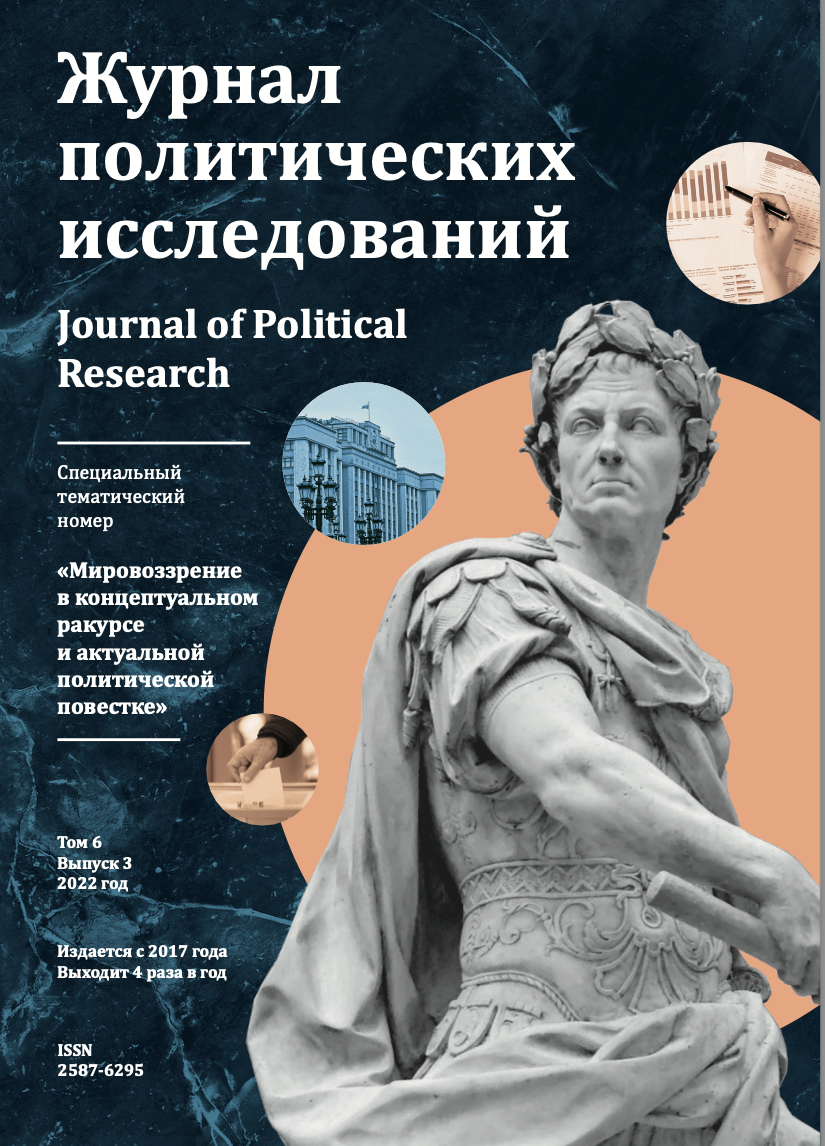Russian Federation
Research in the field of political communication has never been more relevant than it is today, as digital media has penetrated deeply into both the political and social spheres. Citizens use digital platforms to obtain information, form opinions, express their views and organize collective actions, as well as for entertainment and communication. Politicians, parties, and transnational political figures use these platforms to reach, persuade, and influence voters and citizens. The creation of e-government in Russia aims to increase the transparency of government information, receive feedback from citizens, encourage public participation and expand cooperation within the government, as well as between the public and private sectors. Such efforts can ensure public trust and strengthen democratic values, as well as the operational efficiency and effectiveness of the authorities. With the advent of the COVID-19 pandemic, the study of the development of the digital environment has become more relevant. It was important for national governments that public institutions remain operational and open to citizens at a time when it was important to avoid mass gatherings of people, for this it was necessary to eliminate digital gaps, therefore, states began to actively introduce digital services and Internet communication methods, as well as adopt a legislative framework in the field of digital communications. The digitization of political communications has allowed Russia to develop flexible and effective public administration in the shortest possible time, bringing the state closer to its citizens. This, in turn, provides greater transparency and access to information for citizens, and allows for increased monitoring and accountability of the political system. The research uses expert assessment and survey methods. The theoretical significance lies in the fact that the material can be used to develop new methods of communicative strategy in political communication, emphasizing the importance of e-government as a form of political communication through which social tension in society is reduced by forming feedback in which the state receives information about the expectations and needs of society. The practical significance lies in the possibility of preparing educational and methodological manuals, giving lecture courses, as well as conducting seminars in the field of science of political communication.
political communication, communication strategy, e-government, information, digitalization
1. Abdrahmanova G.I., Vasil'kovskiy S.A., Vishnevskiy K.O. i dr. Cifrovaya ekonomika: kratkiy statisticheskiy sbornik // Nac. issled. un-t «Vysshaya shkola ekonomiki». - M.: NIU VShE. 2023 – 120 s.
2. Alekseeva M.B., Pod'yachev A.V. Regional'naya model' vzaimodeystviya elektronnogo pravitel'stva i elektronnogo biznesa // Arktika: obschestvo i ekonomika - 2012 - № 7 (7). - S. 139-148.
3. Belyarov E.P. Problemy vnedreniya sistemy elektronnogo upravleniya i elektronnogo pravitel'stva // Nauchnyy zhurnal - 2021 - № 7 (62). - S. 28-29. EDN: https://elibrary.ru/UCTTQI
4. Vlasov M.V., Kachan Ya.V. Vliyanie elektronnogo pravitel'stva na chelovecheskiy kapital: dinamika vzaimodeystviya // Vestnik Nizhegorodskogo universiteta im. N.I. Lobachevskogo. Seriya: Social'nye nauki. - 2022 - № 1 (65). - S.7-15. DOI: https://doi.org/10.52452/18115942_2022_1_7; EDN: https://elibrary.ru/EQNGKJ
5. Gabazova Ya.D., Goleva G.A. Mezhdunarodnaya ocenka razvitiya elektronnogo pravitel'stva v Rossiyskoy Federacii (na primere indeksa razvitiya elektronnogo Pravitel'stva OON) // Molodoy issledovatel' Dona - 2017. - № 5 (8) – S.170-177. EDN: https://elibrary.ru/ZMQMOF
6. D'yakov E.G. Perehod k elektronnomu pravitel'stvu v Rossii i mezhdunarodnye reytingi razvitiya elektronnogo pravitel'stva // V mire nauchnyh otkrytiy - 2011 - № 11-4 (23). – S. 1159-1166.
7. Dyuysebekova K.S., Muhanov K.N. Elektronnoe pravitel'stvo i elektronnaya demokratiya, upravlyaemye blokcheynom // Internauka - 2019 - № 6-1 (88) – C. 10-14. EDN: https://elibrary.ru/KHHIWZ
8. Ermakov A.V. Pravovye osnovy funkcionirovaniya cifrovogo pravitel'stva Rossiyskoy Federacii (elektronnogo): problemnye aspekty // Obrazovanie i pravo - 2021 - № 8 – S.170-174. DOI: https://doi.org/10.24412/2076-1503-2021-8-170-174; EDN: https://elibrary.ru/ZBRRSO
9. Zotov V.V., Zaharov V.M., Sapryka V.A. Cifrovizaciya publichnogo upravleniya: elektronnaya demokratiya vs elektronnoe pravitel'stvo // Nomothetika: Filosofiya. Sociologiya. Pravo. - 2021. T. 46. - № 2 – S. 250-262. DOI: https://doi.org/10.52575/2712-746X-2021-46-2-250-262; EDN: https://elibrary.ru/CTQMPB
10. Kazakov N.V. Stadii razvitiya elektronnogo pravitel'stva// Problemy i perspektivy razvitiya nauki v Rossii i mire. Sbornik statey mezhdunarodnoy nauchno-prakticheskoy konferencii. - 2016 – S.193-201. EDN: https://elibrary.ru/VZOLAN
11. Kalganov I. S. Ocenka rezul'tatov funkcionirovaniya elektronnogo pravitel'stva i cifrovizacii gosudarstvennyh uslug // Intellekt. Innovacii. Investicii - 2024 - № 1 – S.29-41. DOI: https://doi.org/10.25198/2077-7175-2024-1-29; EDN: https://elibrary.ru/CIOMAM
12. Smirnova E.V. Elektronnoe pravitel'stvo Estonii: ispol'zovanie opyta Estonii dlya razvitiya elektronnogo Pravitel'stva v Rossii // Molodezhnaya nedelya nauki IPMEiT. Sbornik trudov Vserossiyskoy studencheskoy nauchno-uchebnoy konferencii. Sankt-Peterburg. 2021 – S.125-127. EDN: https://elibrary.ru/QJZGEY
13. Smyshlyaev S.M. Elektronnoe gosudarstvennoe upravlenie: regional'nyy uroven' elektronnogo pravitel'stva // Aktual'nye problemy rossiyskogo prava - 2013 - № 3 (28) – S.251-258. EDN: https://elibrary.ru/PZNZAL
14. Trahtenberg A.D. Paradoks elektronnogo pravitel'stva: chto ocenivayut mezhdunarodnye reytingi elektronnogo pravitel'stva // Upravlenie informacionnymi resursami. Materialy XIV Mezhdunarodnoy nauchno-prakticheskoy konferencii. Minsk. 2017. – S. 79-82.
15. Hakimova E.R. Elektronnoe pravitel'stvo i elektronnaya demokratiya kak faktor total'noy cifrovizacii Rossii // Cifrovizaciya obschestva: sostoyanie, problemy, perspektivy - 2022 - S. 251-252. EDN: https://elibrary.ru/EHZGMG
16. Chebotarev V.E., Konovalova E.I. Elektronnoe gosudarstvo, elektronnoe pravitel'stvo, elektronnaya demokratiya na sovremennom etape razvitiya Rossiyskoy Federacii // Yuridicheskiy mir - 2012 - № 7 – S.35-38. EDN: https://elibrary.ru/PFDJZR
17. Shahmuratova I.I., Kiyamova O.V., Zlobina K.A., Ugryumova M.L., Bengert M.D. Razvitie elektronnogo pravitel'stva na osnove ispol'zovaniya tehnologicheskih innovaciy (na primere elektronnogo pravitel'stva Singapura) // Mezhdunarodnyy nauchno-issledovatel'skiy zhurnal - 2019 - № 8-2 (86) – S.6-10. DOI: https://doi.org/10.23670/IRJ.2019.86.8.021; EDN: https://elibrary.ru/QSYOGT
18. Homburg Vincent. Understanding e-government: information systems in public administration. London: Routledge – 2008 – pp. 1-140.
19. Gabriel K., Agnes W. Evaluating the public value of egovernment services // Global Scientific Journals. 2015. I. 5. pp. 1-9.
20. Grönlund A., Horan T.A. Introducing e-Gov: History, Definitions, and Issues // Communications of the Association for Information Systems. 2005, Vol. 15. pp. 713-730.
21. Curtin Gregory G., Sommer Michael H., Vis-Sommer Veronika. The World of E-government. Haworth Press. 2003. pp. 1-300.
22. Lasswell H.D. 'The structure and function of communication in society" in Bryson, (ed.) The Communication of Ideas. N.Y.: Harper and Brothers. 1948. pp. 216-228.
23. Ling Lan. E-government: A Catalyst to Good Governance in China. Knowledge Management in Electronic Government, 5th IFIP International Working Conference, KMGov 2004, Krems, Austria, May 17-19, 2004. [Electronic resource]. URL: http://opendl.ifip-tc6.org/db/conf/kmgov/kmgov2004/Lan04.pdf




















